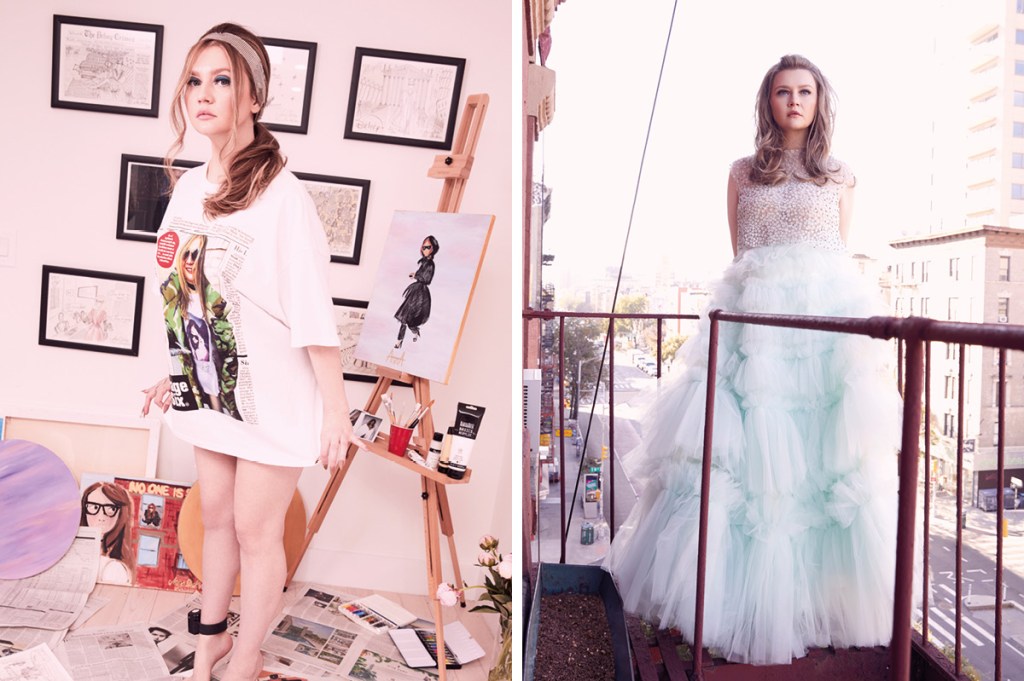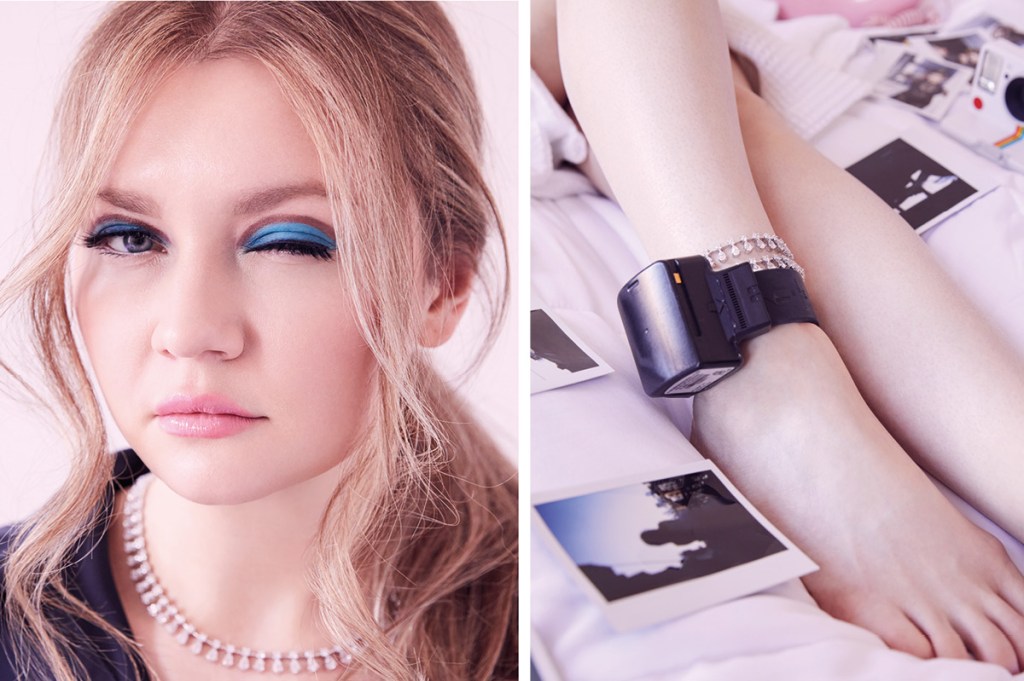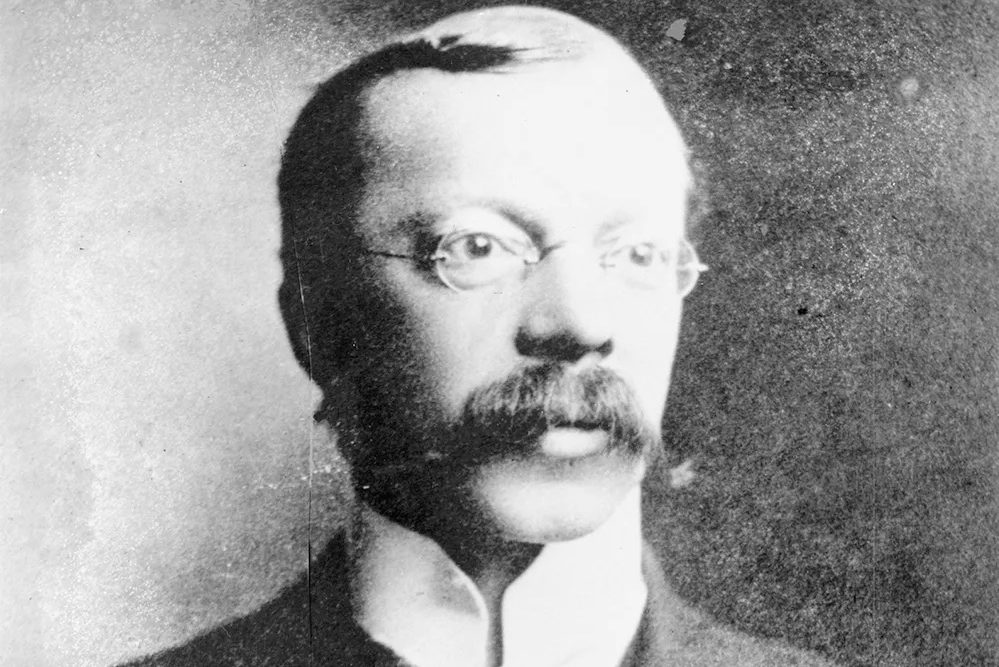Everything is going according to Anna Delvey’s plan. If you’ve read anything about her, you probably think her plan was all about money; to extract millions of dollars from unwitting marks before knocking them to the sidewalk in her hurry to zoom around in private jets with other brainless socialites.
There was plenty of that, of course. If you’ve seen the extravagant Delvey portrayed by Julia Garner in Netflix’s Inventing Anna, you know about the fake heiress who infiltrated New York’s rich set, flitting between boutique hotels with a bizarre “German” accent and Chanel sunglasses bigger than her skull. That Anna demands VIP treatment and calls herself an icon and a legend. The Netflix version is consumed by the fantasy of who she wants to be, unable to see who she really is. But, after nearly four years in prison, that Anna appears to be a thing of the past — if she ever really existed. And after doing time, earning global notoriety and under house arrest in a tiny apartment in Manhattan’s East Village, Anna Delvey insists she has become everything she has ever dreamed of. Maybe more.
“Look what I managed to get out of it,” she tells me with a much more believable German twang than her Netflix character’s. It’s a surprisingly positive outlook from somebody unable to leave her home. As part of Delvey’s ongoing battle with Immigration and Customs Enforcement for overstaying her visa, she is now trapped in her apartment twenty-four hours a day, monitored through an electronic ankle tag. I comment that the black device is pretty plain-looking, and that she could decorate it to go with different outfits. “It needs to stay black,” she says. “That way it matches everything I wear.”
Delvey was released from jail in February 2021, after serving just under four years for a scandalous series of crimes. To recap, briefly: Delvey conned her way into New York society and managed to defraud hotels, banks and her wealthy circle of marks. It was all going swimmingly until she invited three friends on an “all-expenses-paid” trip to Marrakesh in May 2017. After a few days, the hotel staff alerted the group that they weren’t able to charge Delvey’s credit card, at which point she convinced her friend Rachel DeLoache Williams to pay the $62,000 bill, promising to reimburse her when they returned to New York. She never did. Rachel alerted the police and lured Delvey to her catastrophic downfall under the pretense that the pair were going for a nice lunch. Anna turned up and was arrested for second-degree grand larceny, theft of services and first-degree attempted grand larceny.

Just six weeks after her early release for good behavior, Delvey was taken back to jail after ICE took her into custody. Delvey doesn’t want to dwell on these hardships: “There are many people that go through situations and events of adversity,” she tells me. “I was always focused on turning it around and making something out of it.” Still, there’s a degree of repentance. She tells me that she’s trying not to “glamorize the bad act itself,” especially since she has faced criticism for her seeming lack of remorse.
So why did Delvey do it? For somebody who stole an estimated $275,000 from friends, businesses and hotels, how could this not be all about cold, hard cash? She insists when we speak, “it was never about money.” I’ll try to explain what I think she means. To Anna, money was simply the ladder she needed to climb to her real destination: fame. At best, it was a means to what she thought of as a far greater end. At worst, money was something she saw as a bit grubby. Her flippancy when reflecting on her theft shows this; of the sum she stole, she comments to me that “it wasn’t even that much,” complaining that people exaggerate the figure. Delvey, like many in her generation, seems all too aware of how much the good life costs — and refuses to accept that it isn’t something she is entitled to. In a world of Instagram hustlers and fake-it-until-you-make-it tech bros, Delvey is cynical about how others have made their fortunes, and doesn’t trust that playing by the rules will pay off.
Delvey’s background gives us some insight into what it was that she wanted. She grew up in Domodedovo, a town just south of Moscow. Delvey, born Anna Sorokin (the name change came in 2012) was born to working-class parents; her father worked as a truck driver and her mother owned a small store. The family emigrated to Germany when she was sixteen but ran into trouble when people in Germany decided that Anna’s dad was a mobster. She has since said that she “couldn’t wait to leave” her home, adding that her parents “never really knew what to do with her.” She arrived in New York City in 2013.
The Anna I talk to seems less interested in handbags and luxury hotels, and more focused on what money could help her build. When she talks about what it was all for, she doesn’t get het up over wealth, but what she could achieve with it. “I was pretty single-minded in what I wanted,” she says. She thought the way to achieve the fame she craved would be with the Anna Delvey Foundation, a private Soho House-style club on Park Avenue, that focused on art and luxury. In the eighty-page pitch she gave to potential investors, she described how it would become an exclusive home to world-class restaurants, bars, a bakery, working spaces and a hotel. The club was the goal; her crimes were a means to that end.
‘I’m not trying to be like anybody else. I don’t want to be compared to anybody’
All of it — the fashion weeks, the events, the five-star trips, the flattering of A-listers, the Michelin-starred restaurants — was meant to ensure the success of the ADF, she claims. When I asked about her favorite day as Anna Delvey, I expected to hear about a wild celebrity party or twenty-four-course dining experience. But she couldn’t think of one. “I was too busy trying to make this thing [the Foundation] happen to enjoy any of it. I’m not going to be happy until it actually does.” She added that for the years leading up to her arrest, “there was always this kind of a feeling like ‘oh, I should be doing something else to make sure it works out.’”
In popular culture, Delvey’s crimes and intentions have faced radically different interpretations. One camp argues that Delvey is a narcissistic fantasist, so obsessed with money and fame that she hurt everyone who came into contact with her. One of Delvey’s friends, Rachel, was left over $60,000 out of pocket after one trip to Morocco. More than her entire life savings. She was understandably distraught.
Another camp finds irony in the Delvey story. This crowd tends to be younger and more online. They see a young, fame-hungry woman from Russia inadvertently exposing what working people already suspected: that the world operates completely differently for the moneyed class. If there’s anything normal, hard-working people love, it’s to hate the rich. This is why there are articles titled “Why We Sympathize With Anna Delvey,” and t-shirts emblazoned with “fake German heiress.” If you can’t beat them, join them. If you can’t join them, destroy them — and become an eat-the-rich icon.
Delvey doesn’t buy even this more sympathetic assessment of her actions. “The whole narrative of who I was came from one PR statement, and then the ‘fake German heiress’ was born.” She’s referring to the release by a New York district attorney on October 26, 2017, “claiming to be a German heiress in an attempt to secure a $22 million loan to open a private club, SOROKIN provided an employee at City National Bank in Midtown with falsified bank documents showing bank accounts abroad with a total balance of approximately €60 million.” Anna argues that this description of her was “completely mental,” adding that “no one introduces themselves as an heiress like that.” She thinks most of her image is a media concoction: that the creation of the fake German heiress label is proof that sometimes you don’t have to lie all that much — you just don’t correct people when they make assumptions. She’s guilty of a lot, but it’s not exactly hard to imagine that a sexy story about fraud was further sexed up by tabloids. Anna has always maintained that “nobody ever even asked who my parents were.”

How does she respond to the more critical view? “Anybody doing anything is not going to be universally liked,” she tells me, deftly ignoring that her “anything” was a serious fraud. As part of her bail conditions Anna is barred from accessing social media, so the only things she reads about herself is what other people send her. What she does read she doesn’t recognize. “It wasn’t just me just jetting around the world. It wasn’t just me in fashionable clothes at the trial, or going from photoshoot to photoshoot. What people didn’t see was the stretches of time that happened in between.” When you’re living on other people’s credit cards, there are evidently times when the house of cards collapses on you — not that Delvey seems to recognize that this was all her own doing. “You know, there was a time before the whole Netflix thing happened and I didn’t know what was going to happen to me,” she says.
Delvey tells me she hasn’t watched the Netflix show but that she is a fan of Julia Garner, the actress that played her: “She’s done a good job. She’s a great actress.” (I suspect that Anna is also glad that Garner is absolutely gorgeous.) But she wants to emphasize that Inventing Anna was just entertainment; it is, she insists, invented. “The purpose of it is to turn up the volume with some stuff. For example, I was staying at 11 Howard, which is a very minimal hotel.” I’m not sure that all would agree that a five-star hotel in Soho is minimal, but anyway.
She adds that, “the people of middle America decided that it was not luxurious enough. It didn’t translate with them. So Netflix had to put me in a better hotel for the rest of the world to perceive that it was luxurious. They did similar things with the restaurants, the clothes and everything else.”
Inventing Anna was undoubtedly entertaining, but Netflix would have been better off waiting a few years to tell the story. What has happened since Anna’s release from prison is far more surreal than anything the show depicted. Anna Delvey’s greatest hustle is arguably the one she’s pulled off since her arrest. After being charged with her crimes, Delvey was hired as a paid consultant for Inventing Anna, for which she was paid the hefty sum of $320,000. It is, ironically, more money than she was ever convicted of stealing.
After cashing that check, Delvey released a series of NFT artworks that she says “tell her story.” The collection, “Reinventing Anna,” included ten minted NFTs with extra perks that gave buyers “exclusive access” to her by phone, and three which allowed buyers an opportunity to meet her. Alongside that she also spent her time in prison creating sketches for $250 a pop. They’ve already made her about $200,000. “No regrets,” “I am the show,” “Allegedly,” “You’re not who you pretend to be either” — they’re all self-portraits that Anna tells me were “therapeutic” to do during her time in prison. When I ask if she would agree that she is leaning into her villainy with these sketches, she gets defensive and claims that it is instead an attempt to “poke fun at oneself and not take myself too seriously.”
From easy-money sketches to house arrest, nothing about Delvey’s post-prison life is normal. “Nobody gives me credit,” she complains, “for the fact that if I were willing to leave New York I would be free tomorrow, but I don’t want to.” And who can blame her? Her recent thirty-second birthday party, which she dubbed “Club House Arrest,” saw New York socialites lining up outside her East Village apartment. Her current confinement is of her own creation because she doesn’t want to go back to Germany. Even locked up all day every day, Anna recently claimed that “I’m still living better than all of you.”
‘The uniforms are so awful. Like they’re very badly tailored. I think men and women get the same uniforms’
If she loses her immigration battle and has to leave, she tells me that she’ll head for London. But the truth is that Anna knows that New York is the key to her revival. In the words of Dorothy Parker, London is satisfied, Paris is resigned, but New York is always hopeful. It is this hope that has provided Anna with a better post-prison career than most law-abiding citizens can aspire to. Delvey and her publicists are currently starting production of “Delvey’s Dinner Club,” which will see Anna host celebrities, moguls and glitterati for a culinary experience at her apartment. While it is too early for Anna to drop the guestlist, she is audibly excited. I’d take an educated guess and assume that the Uncut Gems actress and model Julia Fox, will make an appearance, after the two struck up a friendship when Anna was behind bars.
Though Delvey was undoubtedly exaggerated in Inventing Anna, there Netflix captured aspects of her character: she often got into trouble with the guards for altering her prison jumpsuit. “The uniforms are so awful. Like they’re very badly tailored. I think men and women get the same uniforms,” she says. She giggled as she recalled taking her sewing kit and going to town on the outfit, modifying it into a “figure-hugging bodycon.” She was proud of her creations and took Polaroid pictures of them. When she was caught by the guards, they made her unravel it with her fingers, stitch by stitch. Anna sounds like she still resents her punishment, telling me, “They made it so dramatic, accusing me of tampering with state property.”
As entrepreneurial as ever, Anna tells me that she also has a few other ventures in the works beyond Delvey’s Dinner Club. “I’m working on my own podcast. What else? I’m writing a book. Kind of like a diary.” When I ask her what the book will be called, she tells me that was the easiest part. “Anna Delvey diaries, something like that.”
She then sends me some pieces she’s already published. “I actually wrote three or four pieces just for fun and I published them online. I ended up having to take it down because they used all my words against me.” I wonder what she possibly could have written to cause such a fuss, and then I came across her letter to disgraced sex-offender Harvey Weinstein: “Being criminal and famous like we are isn’t all fun and strangers sending you pounds of caviar.” That’ll do it.
“Delvey” is now synonymous with “fraud.” But she doesn’t take well to being compared to grifters like Sam Bankman-Fried or George Santos, neither of whom she’s likely to invite to dinner. “There is some misogyny in all this,” she tells me. “Sam is allowed to rest at his parents’ home and he’s allowed to go to visit his lawyers and to therapy sessions, and he’s facing life in prison.” As for Santos, Anna says she’s heard of “people like on Twitter going crazy about him.” She tells me, “I’m not trying to be like anybody else, I don’t want to be compared to anybody. But I guess that’s out of the window.”
Whether you believe Anna Delvey is a cold-blooded criminal or a relatable anti-capitalist-capitalist, there is something astonishing about her. All she ever wanted was her name in lights — and now she has exactly that.
This article was originally published in The Spectator’s May 2023 World edition.

























